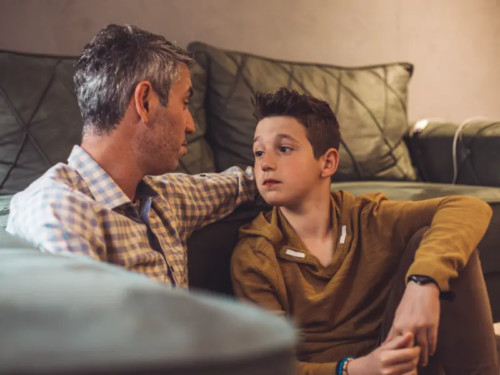
Table of Contents
Types of Trauma: The 7 Most Common Types & Their Impacts
Written By: Charlie Health Editorial Team

Clinically Reviewed By: Dr. Don Gasparini
September 29, 2023
7 min.
Trauma can be physical, emotional, psychological, sexual, societal, and more. Below, we’ll explore seven common types of trauma and their different impacts.
Learn more about our Clinical Review Process
Table of Contents
Once a debated psychological diagnosis, trauma is now ubiquitous in the field of mental health (and the cultural zeitgeist). As our understanding of trauma in both medical and popular culture contexts has grown, so too have the methods used to classify the condition. There is now a litany of different trauma responses, many different ways your body remembers trauma, and types of childhood trauma.
In this landscape, it’s tough to categorize trauma—a far-reaching diagnosis encompassing peoples’ various responses to a wide range of distressing events. In this piece, we’ll offer one way to categorize trauma, dividing it into seven high-level types of trauma and their impacts. Keep reading to learn more.
What are the different types of trauma?
As mentioned, trauma can be categorized in various ways based on its severity, duration, and impact. Trauma can be physical, emotional, psychological, sexual, societal, and more. Below, we’ll explore seven common categories of trauma and their impacts.
It’s worth noting that these are largely not clinical trauma diagnoses but rather categories that different types of trauma commonly fall under (and that certain mental health professionals may refer to). Also, certain types of traumas may fall into more than one category. And, since trauma and trauma responses are inherently personal, people who experience the same traumatic event may ultimately face different kinds of trauma.
“Big-T trauma”
Also known as “large-T trauma,” this trauma category includes significant and often life-threatening events that can lead to severe psychological and emotional distress. Examples include natural disasters, war, severe accidents, and sexual abuse or sexual assault.
“Little-t trauma”
This type of trauma encompasses events that are less severe than big-T trauma but still emotionally distressing. Examples include bullying, emotional abuse, divorce, and the loss of a pet.
Acute trauma
Acute trauma refers to a single, sudden event that causes distress and can lead to short-term emotional and psychological reactions. It is typically time-limited and may include incidents like car accidents or sudden loss of a loved one.
Chronic trauma
Chronic trauma involves repeated or prolonged exposure to distressing events or adverse circumstances over an extended period. Examples include ongoing domestic violence, childhood abuse, sexual abuse, or living in a war-torn region.

Developmental trauma
This category relates to traumatic experiences that occur during critical stages of childhood development and can impact emotional, cognitive, and social development. Examples include childhood trauma such as neglect, attachment disruptions, or exposure to violence in the home.
Complex trauma
Complex trauma refers to situations where a person experiences multiple, chronic, or severe traumatic events, often within interpersonal relationships. It can result in complex and long-lasting psychological effects and is commonly associated with prolonged abuse or neglect. All complex trauma is chronic in nature, but not all chronic trauma is complex, as it can vary in severity and the types of experiences involved.
Secondary trauma
Secondary trauma, also known as vicarious trauma or compassion fatigue, occurs when people who are exposed to the traumatic experiences of others, such as healthcare professionals, therapists, or first responders, develop trauma symptoms themselves.
Historical or generational trauma
Historical or generational trauma refers to the intergenerational transmission of trauma and its effects on subsequent generations. It often results from events like cultural oppression, racism, genocide, or forced migration.

Are you looking for therapy for your trauma?
We create customized, trauma-informed treatment programs for teens and young adults.
What can chronic trauma do to a person?
Chronic trauma, marked by prolonged exposure to distressing events or adverse circumstances, can have profound and far-reaching effects on a person’s well-being. The cumulative impact of chronic trauma can manifest in various ways over time and lead to debilitating mental, emotional, and physical consequences.
Mentally and emotionally, chronic trauma can result in symptoms of anxiety, depression, and other mood disorders. People may experience persistent feelings of fear, helplessness, and hypervigilance, common symptoms of post-traumatic stress disorder (PTSD), a disorder some develop after enduring trauma. These emotional responses can erode one’s sense of safety, self-esteem, and overall emotional stability.

Chronic trauma can also take a toll on people’s health and cognition. Prolonged exposure to stress hormones, such as cortisol, can lead to chronic health conditions like cardiovascular problems, immune system dysfunction, chronic pain, ongoing gastrointestinal issues, and sleep issues. Also, people who have experienced chronic trauma may struggle to focus on tasks and experience cognitive impairment, often referred to as “brain fog.”
In addition to affecting health, chronic trauma can disrupt a person’s ability to form and maintain relationships. People may struggle with trust, intimacy, and emotional connection, as past traumatic experiences can lead to difficulties in establishing secure attachments with others. This can further isolate them and contribute to a sense of loneliness and social withdrawal.
Can trauma be passed down from one generation to the next?
Simply put, yes. In fact, trauma passed down from one generation to the next is a distinct phenomenon referred to as intergenerational trauma or ancestral trauma, which happens when the effects of trauma experienced by one generation impact subsequent generations’ well-being. Trauma can be passed down from one generation to the next in the following ways:
Family dynamics
Traumatic experiences within a family can create a hostile or unstable environment that affects parenting and family dynamics. The trauma survivors’ emotional and behavioral responses to trauma may influence their parenting style and emotional availability to their children, which can then affect how the next generation forms relationships, copes with stress, and continues the cycle of intergenerational trauma themselves.
Epigenetic changes
Emerging research suggests that trauma can lead to alterations in gene expression that can be passed down to offspring (defined as epigenetic changes). These changes can influence a person’s stress response and susceptibility to mental health issues.
Cultural and societal factors
Trauma can affect entire communities and cultures, leading to shared historical trauma. Collective experiences of trauma, oppression, and racism can influence generational cultural norms, behaviors, and coping mechanisms.
What is the difference between trauma and complex trauma?
Trauma
Complex trauma
Any distressing or harmful event affecting a person’s coping ability, ranging from a car accident to assault. It can result in various symptoms, like anxiety, depression, and PTSD.
A specific subtype of trauma that involves enduring multiple traumatic events, usually within the context of interpersonal relationships, like domestic violence or ongoing emotional neglect. It tends to have a more pervasive and severe effect on a person’s mental health than single traumatic incidents.
Although they are related, trauma and complex trauma differ in several ways. Trauma encompasses any distressing or harmful event affecting a person’s coping ability. As mentioned, a traumatic event encompasses a range of experiences, from car accidents to assault, and can result in anxiety, depression, and PTSD symptoms.
Complex trauma, on the other hand, is a specific subtype of trauma that involves enduring multiple, often chronic, traumatic events, usually within the context of interpersonal relationships. These events are typically severe and often involve a betrayal of trust. Examples of complex trauma include enduring childhood abuse, prolonged exposure to domestic violence, or ongoing emotional neglect over an extended period. Complex trauma tends to have more pervasive and severe effects on a person’s mental and emotional well-being than single traumatic incidents.
What are the best treatments for complex trauma?
The treatment of complex trauma is inherently personal and typically holistic, as it involves addressing multiple traumatic experiences and their lasting effects on a person’s mental, emotional, and relational well-being. Some of the best treatments and therapeutic approaches for complex trauma include:
Trauma-informed therapy
Trauma-informed therapy, such as trauma-focused cognitive behavioral therapy (TF-CBT), is designed specifically to address the effects of trauma. It is a form of trauma-informed care that aims to help people process and reframe traumatic memories, reduce symptoms of PTSD, and develop coping strategies. A trauma-informed approach can also be taken in any treatment setting—even those not specializing in trauma-informed care, which involves creating a safe and validating environment where people feel respected, understood, and empowered.
Dialectical behavior therapy (DBT)
DBT is effective for many people with complex trauma, as it focuses on emotional regulation, distress tolerance, interpersonal effectiveness, and mindfulness. It can also help people manage intense emotions and impulsive behaviors that often result from trauma.
Mindfulness
Mindfulness practices, such as deep breathing and meditation, can help people with complex trauma become more aware of their emotional responses and develop self-compassion and emotional regulation skills.
Group therapy
Trauma-informed group therapy provides a supportive and validating environment for people with complex trauma to share their experiences, reduce isolation, and learn from others with similar life experiences. Group therapy can address issues like trust, boundaries, and attachment for people dealing with complex trauma.
Medication
In some cases, medication may be prescribed to alleviate symptoms of depression, anxiety, or other mental health conditions associated with complex trauma. A psychiatrist can assess and determine if medication is appropriate.
Healing from trauma with Charlie Health
If you are dealing with the effects of any type of trauma, Charlie Health is here to help.
Our virtual Intensive Outpatient Program (IOP) offers more than once-weekly therapy for teens and young people dealing with complex mental health challenges—including trauma, complex trauma, and more. Charlie Health combines group sessions, individual therapy, and family therapy for more sustainable healing. Our expert clinicians match every client with a group of peers facing similar challenges to them—including a specific track for those struggling with trauma.
Fill out this short form to learn more and start your healing journey today.




